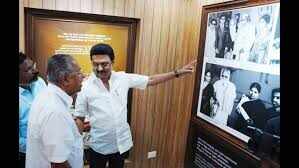Can we repeat Vaikom in Tamil Nadu after 100 years?

MK Stalin is the rock star of Kerala. People lined the streets to greet him last week when he was there to attend the centenary celebrations of the Vaikom satyagraha, a non-violent protest that helps people considered “lower castes” gain access to Vaikom temples after decades of discrimination. . and shook hands with the Chief Minister of Tamil Nadu. One wonders whether Kerala Chief Minister Pinarayi Vijayan would have received such a reception in his home state.
Stalin in Vaikom, a Dravidian descendant of Periyar, was imprisoned for 74 days for participating in the Satyagraha movement, which Mahatma Gandhi also participated in (Gandhi proposed a campaign against untouchability on the 39th) decision)th He chaired the Indian National Congress meeting in Belgaum on December 26, 1924). For the Tamil Nadu chief minister, it is also an opportunity to burnish his image as the heir apparent of the social justice movement.
Struggles like Vaikom satyagraha, while worthy of celebration, should also serve as a reminder to men like Stalin to clean up the system in the country. It cannot be denied that apart from the communists, the Dravidian movement also fought for the abolition of untouchability. However, many forms of caste discrimination still exist in Tamil Nadu. Dalits in some villages are still forced to walk barefoot in public; they are banned in some temples; their children are attacked when they try to challenge discrimination they cannot understand.

These aren’t just happening in the dark underbelly. It was not until September 2024 that Dalits from Chennai’s neighboring Tiruvallur district were allowed to enter the Bidari Ettiyamman temple in Vazhuthalambedu village. Last year, Dalits from Tiruvannamalai Chelankuppam village came to the Mariamman temple to pray after a gap of more than a hundred years. Dalits are not allowed to wear shoes in villages like Rajavur and Maivadi in Madathukulam town of Tirupur. These villages are also among the many that continue to practice the “double cup” system, where tea shops keep a separate set of cups for Dalits.
Worse still, the next generation seems to be being groomed to promote these evils. In August last year, the Justice Chandru Committee submitted a report to the state government confirming the practice of assigning color-coded wristbands to students to identify their caste. In January this year, a survey of students by the Tamil Nadu Dalit Eradication Front found that at least 15 schools had Dalit students cleaning toilets and being forced to eat lunch separately from others.
Some welcome changes, such as the recent reopening of some temple gates for Dalits, have been brought about mainly by a few proactive district collectors and field officials. There is only so much the bureaucracy can do. Eliminating untouchability requires political will and concerted efforts. A casteless society is a utopia, but a casteless society is not a pipe dream. We cannot expect parties that select candidates on caste basis to eliminate caste, but if they want to show that they can practice a fraction of what they preach, they should form unit-level teams to fight untouchability. (CPM is the only political party in the state with a separate unit dedicated to eradicating this social evil).
We have enough rules to deal with caste atrocities. What we need is strict enforcement. The government should have a department separate from social welfare to specifically address this issue and ensure deterrent punishment for the perpetrators. If the government needs a motto to act upon, here are two words that represent Periyar: Self-respect.
Disclaimer
The above views represent only the author’s personal views.
End of article






